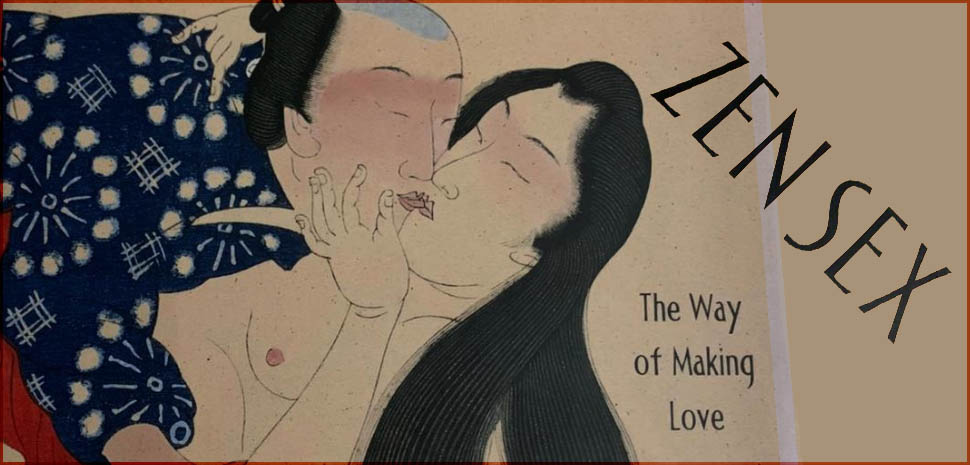Zen Sex by Philip Toshio Sudo is a wonderful meditation on directing love to another, self-love, and surprisingly, the teaching of Zen. Published in 2000, I had purchased the book among a pile of other Zen texts (the actual writings of Zen Masters) when visiting a favourite used book store with my wife nineteen years later. I grabbed Zen Sex more for the expected novelty factor of it on the shelf, as I hadn’t expected to take much from its pages as I would with the other books I selected that day. It took a year for me to finally end up reading it, and I must say that I loved the experience, I loved the book, and I loved being wrong. As I laid in bed and read it from cover to cover in one sitting (or laying), I meditated as I flipped through each thoughtful page on Zen, life, and sex.
When I first saw the book, my ignorance expected the standard ‘self-help’ style writing that contains as much ‘Zen’ as the stone statue sold in Wal-Mart, or the calming blend of tea carrying that name, or even that album with the river on the cover featuring a silhouette of a woman in meditation. When I read the back blurb it mentioned Zen koans, and I then expected it to feature the writing of Zen Master Ikkyu, AKA Crazy Cloud. I wasn’t wrong there, Ikkyu’s verse is a thread throughout the book, but there was so much more than I expected, from quotes of Zen Masters such as Joshu, Hui-neng, and Hakuin, to references of scholars such as Joseph Campbell. These materials were not just slapped together, but examined, extrapolated upon, and then beautifully conveyed in eloquent, succinct wording.
Sex and death are intrinsically linked, this connection being brought up in a few chapters, but whilst reading, I was drifting in thoughts on life, both its frailty and beauty. This book offers so much more than its title or cover would convey, and may be one of the top books I’d suggest for someone who has expressed interest in getting started with the study of Zen in general. With the aforementioned Masters referenced and quoted, there would be plenty to investigate from here, along with some helpful pointers by Sudo of the quotes shared should the reader be unfamiliar and have their interest sparked.
Sudo’s writing and materials even gracefully elevated Ikkyu’s verse, which I had previously read years ago in a .PDF which simply put all of his poems together – and in that format, while I understood the reason for his prominence in the context of the tradition, I took little from his words. In the context of Zen Sex, Ikkyu’s prose opened up like a flower bathing in sunlight.
‘We appear as skeletons covered with skin, male and female, and lust after each other. When the breath expires, though, the skin ruptures, sex disappears, and there is no more high or low. Underneath the skin of the person we fondle and caress right now is nothing more than a bare set of bones. Think about it–high and low, young and old, male and female, all the same. . . This is how the world is. Those who have not grasped the world’s impermanence are astonished and terrified by such change. . . Free yourself from form and return to the original ground of being.’ – Ikkyu
Ikkyu is fascinating in the general context of Zen study, especially in contrast to the common image of chaste monks; he was open of homosexual encounters he had in his youth, and would write about masturbation and sex. While his writing consists of what often appears degenerate, brash and silly on the surface, to view it only as such would miss the wisdom and beauty in his words, and miss the meaning behind his penning them. Ikkyu’s red thread metaphor, our bloodline, examines the naturalness of our birth, the natural longing to embrace another, and the normalcy of sexual thought and act. To deny it in order to ‘act Zen’ is to delude oneself more than anything, it is to dissociate from who and what we are.
‘don’t hesitate get laid that’s wisdom
sitting around chanting what crap’ – Ikkyu
I would highly recommend that anyone in a relationship, anyone looking to get into a relationship, or anyone wishing to have a more comprehensive view of life and love to read this book. I’ll surely be reading it again. Something that stuck with me that I wished to share when I had the idea of putting this post up was a quote from the author. Sudo wrote, ‘Familiar as our lover may be to us, we treat each night in the bedroom as special. We do not wait for a diagnosis of cancer to start savoring our lover’s kiss. We do it now. Should tomorrow come, we do it again.’
I was saddened when I googled the author’s name, but also struck more deeply by that passage, having to then sit with it a little. On April 2, 2001, Philip Toshio Sudo had been diagnosed with stomach cancer and passed away just two years after the publication of Zen Sex at the age of 41, leaving behind his wife, and three small children. Here is an interview with Sudo which shared a diary entry from the day of his diagnosis. I’ll end this post with the last lines of that entry.
‘Love will endure through those whom we have loved.
Life is sorrowful, but to be lived in joy.‘ – Philip Toshio Sudo


